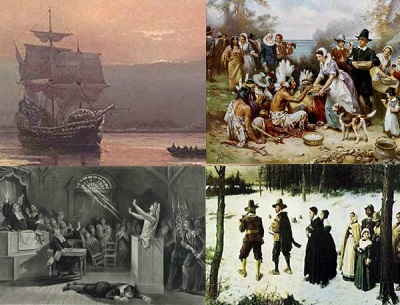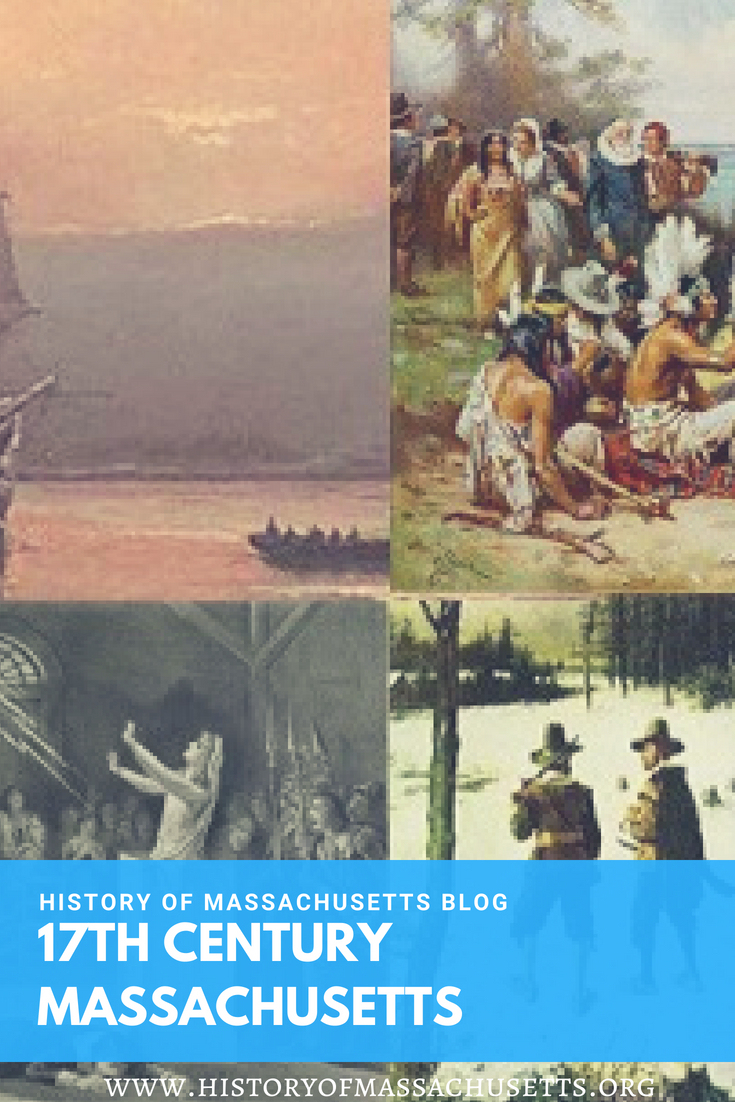The 17th century was a time of immense change in the history of Massachusetts.
Tens of thousands of Native-Americans lived in Massachusetts prior to colonization and the area was frequented throughout the 16th and 17th century by European traders and fisherman. These traders and fisherman inadvertently introduced diseases to the Native-Americans that quickly devastated their population.
By the time the colonists arrived in the early 17th century, the Native-American population had already been dramatically reduced and much of their land was vacant and available for settlement. Once colonization began in the 1620s and 1630s, the colonist population of the area suddenly exploded and overcrowding quickly became an issue.
Two colonies were established in Massachusetts, Plymouth Colony and the Massachusetts Bay Colony, and these early colonists faced many hardships including disease, famine, brutal winters, hot and humid summers, warfare with local Native-American tribes as well as with other countries that were also trying to colonize North America and political struggles due to political instability in England.
The colonies in Massachusetts started off as separate, privately-run colonies but by the end of the century the British government took control of them and merged them into one large royal colony under the close rule of the crown. This itself caused a lot of unrest and anxiety in Massachusetts at the end of the century and made the colonists fearful of the future of their colony.
The following is an overview of important events in 17th century Massachusetts:
Captain John Smith Explores New England:
Captain John Smith was an explorer who helped settle the Jamestown colony in Virginia. After he was forced to leave Jamestown due to his unpopularity there, he later sailed to New England in 1614 with the hopes of starting a colony there.
Smith himself coined the name “New England” and also named a number of Massachusetts landmarks that still retain these names today. Smith returned to England with a newly drawn map of the New England region and tried to raise funds and support for his own colony there but failed after numerous attempts and never returned to New England again.
The Great Puritan Migration:
The Great Puritan Migration was a period between 1620 and 1642 when English Puritans migrated to the New World, particularly to New England, the Chesapeake and the West Indies.
The Puritans came for a number of reasons, but mostly for religious freedom and economic opportunities.
Puritans were non-conformists and dissidents who wanted to reform the Church of England. As a result, they were often subject to harsh laws and persecution in England on account of their religion which prompted many of them to leave England.
New business opportunities in New England and the Caribbean, particularly the harvesting of natural resources to send back to Europe, also enticed these Puritans to leave their homeland and migrate to the New World.
During the Great Puritan Migration, a number of historic events occurred in Massachusetts, such as the pilgrim’s historic voyage on the Mayflower, the founding of two colonies: Massachusetts Bay Colony and Plymouth Colony, and the First Thanksgiving.
King Philip’s War:
King Philip’s War of 1675-76, also known as the First Indian War, was a war between the Native-Americans and the colonists in New England and is considered the deadliest and most devastating conflict in North America in the 17th century.
The war killed over five percent of New England’s English population and over 10 percent of its Native-American population, destroyed over 10 percent of the towns in New England as well as numerous Indian villages and ruined New England’s economy, wiped out much of the previous generation’s investments in the colonies and halted English expansion in the region for 50 years.
The war is considered a major turning point in American history though because winning the war gave the colonists control over the region.
The Salem Witch Trials:
The Salem Witch Trials took place in Salem in the year 1692. Like many of the settlements in the Massachusetts Bay Colony, Salem was under a lot of stress at the time due to disease epidemics, warfare with local Native-Americans, crop failures and the political turmoil brought about by the colony’s loss of the original charter in 1684 and the establishment of a new royal charter in 1691. It is believed these issues were some of the underlying factors that caused the witch trials.
The trials began when a group of girls in Salem Village began behaving strangely in the winter of 1692 and a local doctor determined they were bewitched.
After the girls named three women who they believed were bewitching them, one of the women, Tituba, confessed that she was in fact a witch.
Tituba’s confession triggered a mass hysteria in the settlement which prompted the colonists to turn on each other and, as a result, kick started the infamous Salem Witch Trials during which hundreds of people were accused and 19 people were executed.

Images of Massachusetts in the 17th century. Top left: Image of the Mayflower arriving in New England. Top right: Image of the first Thanksgiving. Bottom left: Image of the Salem Witch Trials. Bottom right: Image of the pilgrims going to church
Sources:
LeVert, Suzanne and Tamra B. Orr. Massachusetts. Marshall Cavendish Benchmark. 2009.


I have found that I have a definite connection to Salem, Mass and I was wondering how do I get more info other than on Ancestry.com?
My 8th great-grandfather, Walter Woodworth (ca.1612 – 1686), might have been part of the great Puritan migration. He was in Scituate, Plymouth Colony, New England by 20 Feb 1634 (he was named as an abutter in a land grant to Anthony Annable at First Herring Brook).
How might I search your blog for entries naming Walter Woodworth or Walter Woodward (he changed his surname after he arrived in the colony from Woodward to Woodworth.
There is a search feature in the top right hand corner of the page but that name is not familiar to me so I don’t think I have any info on him
There are numerous groups (both public and private) on Facebook for all things genealogy – Massachusetts – Salem – Great Migration etc. etc. etc. It is worth (re)joining for that reason alone. You can control security and privacy settings. There are too many groups to mention – just google them + “Facebook” first. One of the best organizations is the New England Historic Genealogical Society, on or off Facebook. Their web site is AmericanAncestors dot org.